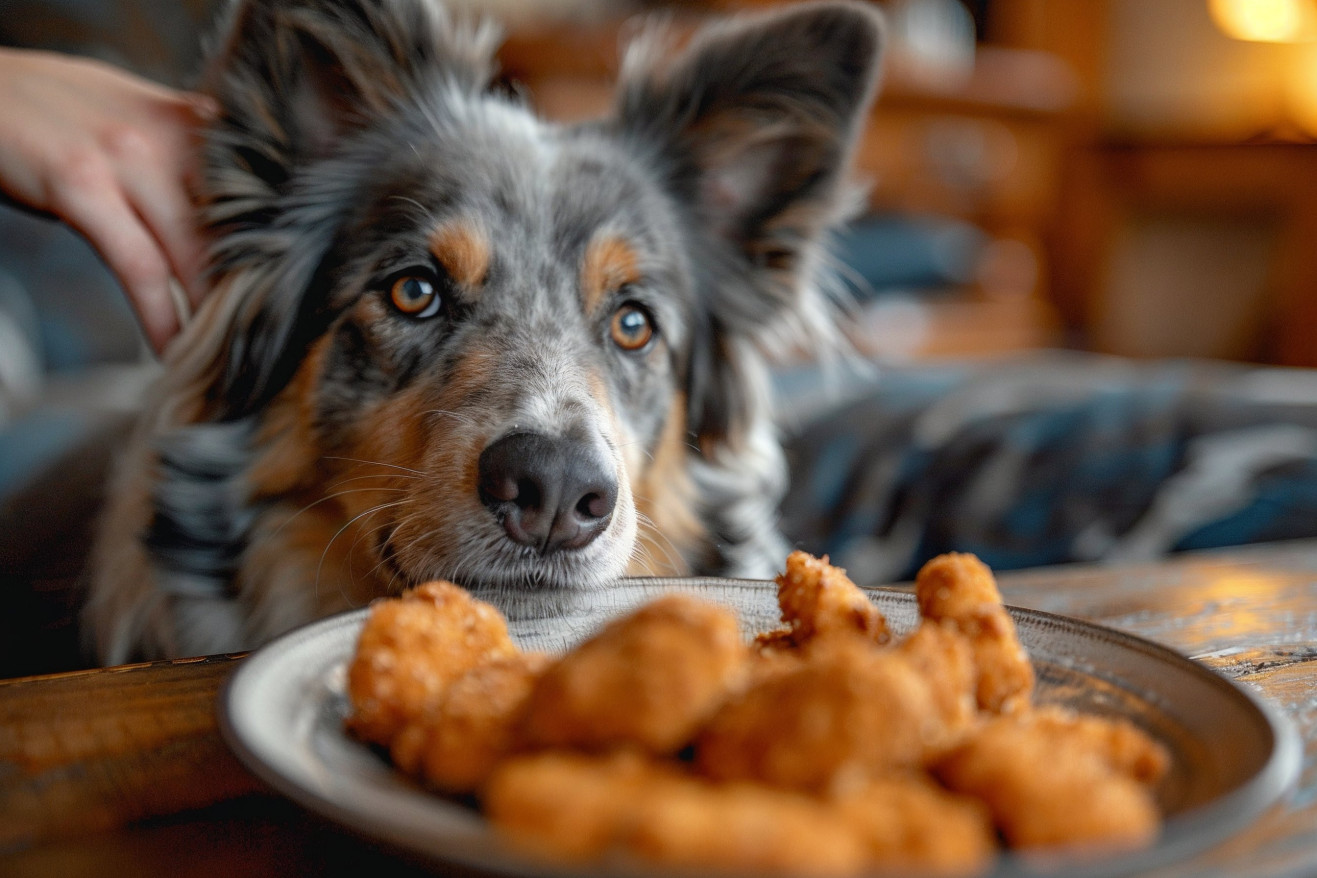Can Dogs Have Chicken Nuggets? Know the Risks and Other Options
24 February 2024 • Updated 22 February 2024

Chicken nuggets are a classic fast-food treat, but they may not be the best snack for your dog. So, can dogs eat chicken nuggets? While dogs can eat chicken nuggets, they are not recommended due to their high fat, salt content, and harmful additives.
These ingredients can lead to health problems like pancreatitis and obesity in dogs. Instead, there are other options that you can give your dog, such as plain, cooked chicken that is free of any seasonings.
This article will evaluate whether or not chicken nuggets are safe for dogs by looking at veterinary nutrition studies, dog dietary research, and information from reputable animal health professionals.
This in-depth analysis will help you better understand your pet’s nutritional requirements, the potential dangers of human food treats, and other options that are healthier than chicken nuggets. By the time you finish reading, you will be better equipped to make decisions about the occasional treats you give your dog.
Can dogs have chicken nuggets?
Meeting Your Dog’s Nutritional Needs
Knowing what dogs need to eat is important for making sure that they are healthy and happy. VCA Animal Hospitals explains that a complete and balanced diet for dogs includes water, protein, fat, carbohydrates, vitamins, and minerals.
Protein is important because it is the basic building block of body tissues, while fat is a source of energy. Carbohydrates are also a source of energy once they are metabolized, and they are easier to digest when they are cooked.
A dog’s age and level of physical activity will determine how much of each of these nutrients they need.
For example, puppies have different nutritional needs than adult dogs, and adult dogs have different nutritional needs than senior dogs.
PetMD explains that the key is to make sure that the right balance of these nutrients is met, and this balance will be different for each individual dog.
This is why it’s important to make sure that treats like chicken nuggets, which are often high in salt and fat and may contain ingredients that aren’t part of a dog’s natural diet, are given in moderation, if at all, to avoid throwing off this balance.
In general, treats should make up a small percentage of a dog’s diet, ideally no more than 10%. A vet can help you make sure that you are meeting your dog’s nutritional needs.
Purdue University College of Veterinary Medicine recommends working with a vet to plan your dog’s diet to make sure that it meets their nutritional needs, supports their overall health, helps prevent disease, and is appropriate for their life stage. By making sure that your dog’s diet is personalized to meet their unique needs, you can help them live a healthier life that goes beyond the occasional treat.
Other Risks of Feeding Your Dog Chicken Nuggets
In addition to the risk of salmonella, there are other reasons to avoid feeding your dog chicken nuggets. For one, the high levels of salt and trans fats that are often found in fast-food chicken nuggets are not good for dogs.
These ingredients can lead to a number of health issues, including pancreatitis, which is a painful and potentially life-threatening inflammation of the pancreas. High-fat, high-calorie foods can also lead to obesity, which can cause a number of other health issues, including arthritis, diabetes, and heart disease, according to Hill’s Pet.
If your dog eats chicken nuggets that contain these ingredients, watch for signs of sodium toxicity, which include increased thirst, diarrhea, and vomiting. In addition, some dog foods contain preservatives that can be harmful to dogs, and the same is true of some human foods, including chicken nuggets, according to Raised Right Pets.
If your dog eats chicken nuggets, keep an eye on them for any signs of a reaction. If you notice any serious symptoms or if you think your dog has eaten a large amount of chicken nuggets, contact your vet right away. This is the best way to ensure your dog’s safety. Be sure to watch out for these risks to keep your dog safe and healthy.
Chicken in Your Dog’s Diet: How to Make the Most of the Benefits While Avoiding the Risks
Chicken is a great source of lean protein for dogs, providing essential nutrients without too many calories. In addition to being a good source of energy, chicken is also full of important vitamins like B6 and B3, and minerals like zinc, all of which are important for your dog’s overall health.
The leanness of chicken is especially important for dogs that are less active or getting older, as it helps with muscle maintenance and immune function.
That said, not all chicken products are created equal. Processed chicken products like chicken nuggets can be full of unhealthy fats, salts, and other additives that aren’t healthy for dogs.
On the other hand, plain cooked chicken that’s prepared properly is safe and can be a healthy part of a dog’s diet. It’s important to make sure that chicken is cooked thoroughly to avoid the risk of pathogens like salmonella and that any bones are removed to prevent choking hazards.
Dogs can also be allergic to chicken, which can cause symptoms like skin rashes and digestive issues. This is another reason why it’s important to make sure that you’re feeding your dog chicken in moderation and that you’re introducing it to their diet carefully.
To make sure that you’re feeding your dog chicken in a way that’s safe and healthy, stick to boiled or baked chicken that’s free from harmful seasonings, and always talk to your vet before you make any changes to your dog’s diet.
And always remember that, even when it comes to chicken, the most important things to focus on are quality and preparation, both of which are important to ensuring that you’re keeping your furry friend as healthy and happy as possible.
Healthy Alternatives to Chicken Nuggets for Dogs
If you’re looking for alternatives to chicken nuggets for your dog, there are plenty of fruits and vegetables that are safe and healthy for dogs. The American Kennel Club recommends apples because they are high in vitamins A and C and fiber—just be sure to remove the seeds and core.
Blueberries are another great option because they are high in antioxidants and fiber. If you’re looking for something to cool your dog down on a hot day, try freezing apple or blueberry slices.
Another option is to make your own treats. Pet experts suggest a simple recipe that involves mixing peanut butter with plain yogurt and freezing it in ice cube trays to make healthy popsicles. That said, it’s important to remember that, as WebMD points out, treats should make up no more than 10% of a dog’s daily caloric intake.
If you decide to go with store-bought treats, make sure to choose dog treats that are formulated to meet nutritional requirements. These treats often contain fruits and vegetables, which can make for a healthy snack without the fat and salt that comes with chicken nuggets.
And, of course, always talk to your vet before you add new treats to your dog’s diet to make sure they are safe and meet your pet’s specific health and dietary needs.
Navigating Canine Nutrition: Expert Insights on Treats and Diet
Veterinary experts and pet nutritionists are pretty much in agreement that you shouldn’t give your dog chicken nuggets, a view that is backed up by PetMD. The high levels of unhealthy fats, salt, and other additives in these fast-food staples are not in line with a dog’s nutritional requirements.
The Kennel Club also stresses the importance of giving treats in moderation, noting that treats should make up a very small part of a balanced diet. They also note that it’s important to know the dog’s specific dietary requirements, which can depend on factors such as age, breed, and health.
The Kennel Club advises dog owners to keep learning and working with animal health experts to make sure they are feeding their pets properly. This will help ensure that all treats, even those that are an alternative to chicken nuggets, are safe and healthy.
All of the experts agree that fast food is not the way to go and encourage pet owners to opt for treats that will help support their dog’s nutritional and overall health. This will help support a dog’s overall physical well-being and encourage pet owners to follow responsible, well-informed pet care.
A Word of Caution: Final Takeaways on Dogs and Chicken Nuggets
In this post, we’ve gone over the important details that you need to know about giving chicken nuggets to dogs. While chicken nuggets are not poisonous, they are high in fat, salt, and calories, which makes them a poor fit for a dog’s nutritional needs.
This is backed up by A-Z Animals, which explains that dogs are omnivores and need a combination of meat and vegetables, not the processed foods that are part of the standard fast-food meal.
Dope Dog explains that eating chicken nuggets can lead to a number of health problems for dogs, including obesity, pancreatitis, and allergic reactions. The key is to use them in moderation and supplement them with other healthier options, like homemade treats or vet-approved snacks, to ensure that your dog’s health isn’t compromised while still giving them an occasional treat.
In the end, it’s up to pet parents to make the best choices for their dogs when it comes to their diets. This means following the advice of the Cummings School’s Clinical Nutrition Service to make sure that you’re giving your pet complete and balanced nutrition while avoiding excesses and unnecessary additives.
That includes making sure that the treats you give them are contributing to their health and happiness instead of detracting from it. So, skip the fast food and make sure that you’re giving your faithful friend healthy, nutritious treats.


